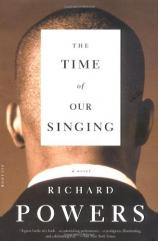The Time of Our Singing
Review
The Time of Our Singing
Readers of Richard Powers's breakout novel, THE GOLD BUG
VARIATIONS, already know that no one in contemporary letters writes
about music or science with the depth of feeling or grace of
metaphor that Powers brings to the subjects. THE GOLD BUG
VARIATIONS, Powers's third and breakout novel, conflated J.S.
Bach's Goldberg Variations with the cracking of the genetic code
(as well as with Edgar Allen Poe's story "The Gold-Bug"). Powers
returns to music and science in his eighth novel, THE TIME OF OUR
SINGING, this time using them as an entryway to reflections on the
role of race in the lives of individuals and American
society.
Through two story lines that ultimately intersect, the novel
recounts the history of the Strom family, a family remarkable for a
number of reasons, not the least of which is the innate musical
talent that finds its greatest --- or at least most public ---
outlet in Jonah Strom, a vocal prodigy who makes the singing of
chamber music his life and livelihood. Jonah is the eldest son of a
Jewish physicist who left Germany to escape the Nazis and an
African-American woman from Philadelphia who met on the Mall in
Washington D.C. during the historic performance by Marian Anderson
on Easter day 1939. Improbably, the two fell in love and their
union produced three offspring: Jonah, Joseph --- who narrates much
of the novel and is Jonah's accompanist --- and Ruth, who finds her
identity in the more radical arm of the civil rights movement and
rejects her brothers' love and performance of European music.
The novel's primary concern may be the ways in which racial
identity influences the course of a person's life, but along the
way, Powers offers remarkable descriptions of music and the process
of creating it: "This is how I see my brother, forever. He is
twenty; it's December 1961. One moment, the Erl-King is hunched on
my brother's shoulder, breathing the promise of a blessed
deliverance. In the next, some trap-door opens in the warp of the
air and my brother is elsewhere, teasing out Dowland of all things,
a bit of ravishing sass for this stunned lieder crowd, who can't
grasp the web that slips over them. He touches his tongue to his
hard palate, presses on the cylinder of air behind it until his
tongue tips over his front teeth with a dwarf explosion, that
fine-point puff of tuh that expands, pulling the vowel
behind it, spreading like a slow-filmed cloud, to ta to
tahee to time to transcend the ear's entire horizon,
until the line becomes all it describes. . ."
The nature of time itself plays a key role in the book, as David
Strom's scientific theorizing explores that very subject. Indeed,
the theories of time he presents in the novel --- rendered as
beautifully as the musical descriptions --- lay the groundwork for
the one "trick" Powers could be accused of playing on the reader.
The plot point cannot be described without revealing too much about
the novel's carefully constructed end, but the trick itself is the
work of a master illusionist rather than of a literary con man,
inspiring wonder rather than disappointment.
Occasionally, the characters -- especially Ruth -- seem somewhat
hollow, as discussions about racial identity threaten to become
lists of talking points rather than realistic, messy conversations.
Still, Powers has created a fascinating family that, through its
various members, tries a multiplicity of ways to come to grips with
what it means to be black, white or in between. To that end, Powers
also conjures up compelling portraits and retellings of historical
events, including the delivery of Martin Luther King's "I have a
dream" speech, the Watts riots, the aftermath of the Rodney King
verdict and the Million Man March.
THE TIME OF OUR SINGING is a lengthy, slow read that does not have
quite the narrative force of some of Powers's earlier novels (THREE
FARMERS ON THEIR WAY TO A DANCE, THE GOLD BUG VARIATIONS, GALATEA
2.2). Nevertheless, the novel is unfailingly beautiful and the
ideas it considers are endlessly fascinating, rendering the journey
a rewarding one indeed.
Reviewed by Rob Cline (rjbcline@aol.com) on January 23, 2011
The Time of Our Singing
- Publication Date: January 1, 2004
- Genres: Fiction
- Paperback: 640 pages
- Publisher: Picador
- ISBN-10: 0312422180
- ISBN-13: 9780965753838





